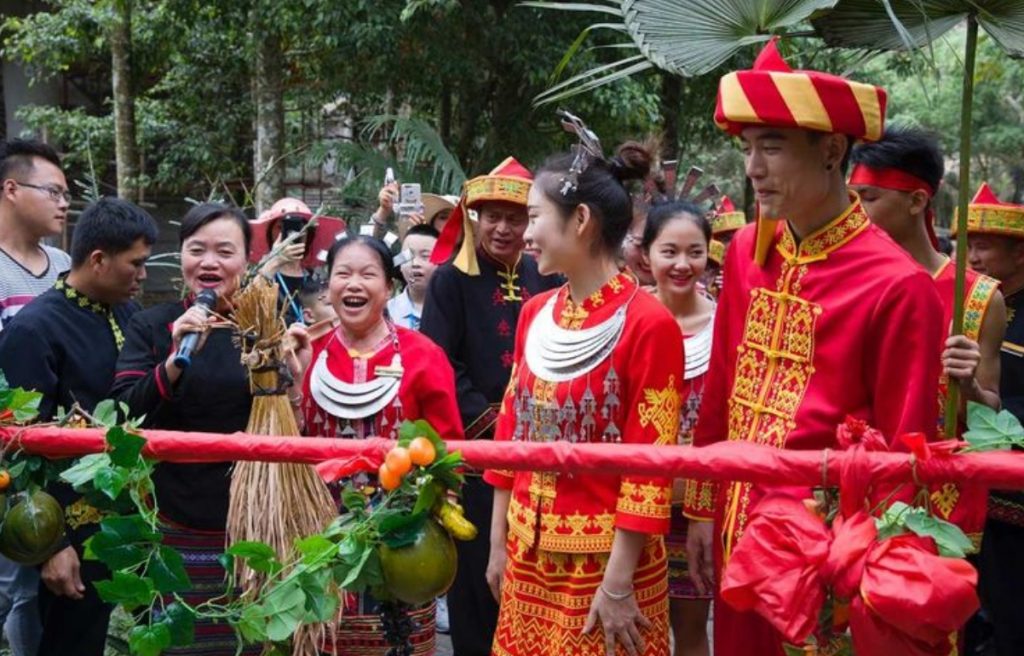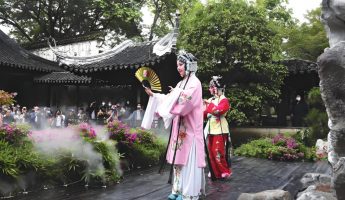In the traditional culture of the Li ethnic group, marriage is regarded as an important ceremony for family continuation and happy inheritance, and its wedding customs are full of unique ethnic customs and profound cultural heritage.
1、 Intimacy and marriage proposal
When a young man of the Li ethnic group shares his feelings with the girl he admires, he will first express his feelings to his family and carefully select two eloquent and sociable matchmakers. These two matchmakers dressed in gorgeous Li ethnic floral dresses, wearing brand new exquisite bamboo hats, and carrying carefully selected betel nuts as gifts, went to the woman’s home to “explore” – that is, to test the woman’s family’s attitude towards this marriage. If the female elder readily accepts and tastes betel nut, it is a good omen of the initial achievement of the marriage between the two parties. Subsequently, the two families jointly agreed on an auspicious day, usually on the even numbered days of June or August in the lunar calendar, symbolizing pairing up and good things coming in pairs.
2、 Betel nut conveys emotions, engagement feast
On the selected day, the matchmaker visits again with abundant betel nut gifts and presents them one by one according to seniority. Among them, 40 specially customized betel nuts with exquisite patterns are precious gifts specially prepared for the female’s parents and close relatives. At the dinner party, the bride’s family only invited two non widow women as representatives to entertain guests. The dishes during the banquet were mainly double tailed fish, symbolizing harmony and happiness, while meat was relatively rare. During the dinner party, follow traditional customs to avoid utensils falling off or colliding and making noise, as a sign of respect and cherish for marriage.

3、 Choose an auspicious day and agree on a wedding date
After the groom’s family is ready, a matchmaker will be dispatched again in December of the lunar calendar to bring gifts such as ducks, rice wine, and betel nut to the bride’s house for a “date inquiry” ceremony – that is, to agree on the specific date of the wedding and dowry items. The groom also needs to pay a certain amount of dowry, clothing, rings, large pigs, and rice wine as a gesture of sincerity. After friendly negotiations between both parties, an auspicious day was finally chosen, often an even numbered day corresponding to the Chinese zodiac signs such as dragon, ox, horse, and sheep, symbolizing a happy and long-lasting marriage.
4、 Welcome and send off, mandarin ducks dance together
On the eve of the wedding, the groom’s family sends young women from the tribe to welcome the bride with gifts such as betel nuts, cigarettes, candies, etc. They must arrive before sunset. As night falls, the relatives and friends of the bride’s family gather together to dress up and groom her, creating a warm and touching scene. The bride, surrounded by her sisters, tearfully bid farewell to her family. The cry reflected not only her attachment to the past life, but also her longing and anxiety for the future life. With the help of her brother-in-law or cousin in law, the bride was slowly escorted out of the house and embarked on a journey to her husband’s home.
5、 Joyful Entry, Chapel Marriage
The bride and her entourage arrived at the groom’s village amidst the joyful music of the band, and the groom and groomsman respectfully saluted the bride and her entourage. At the moment when the bride crosses the threshold, firecrackers ring out in unison, creating a festive atmosphere. The subsequent worship ceremony was solemn and dignified, with the newlyweds dressed in traditional dresses and devoutly kneeling to worship heaven, earth, and ancestors, praying for a happy marriage and prosperous family. After the ceremony, family and friends gathered together to celebrate the joyous occasion, and it remained lively until late at night. However, according to customs, on the wedding night, the couple must endure the desire to gather together and are not allowed to sleep together.
6、 Returning home to visit relatives, deep affection and long-lasting feelings
The next morning, the door was filled with guests and the banquet was full. After three rounds of drinking and five flavors of cooking, the newlyweds need to return to the bride’s home together to visit her parents and express gratitude – this traditional custom is affectionately known as the “circuit”. In this warm and solemn moment, not only did it deepen the emotional bond between the couple and their respective families; This further reflects the Li people’s unparalleled appreciation and inheritance of family harmony and deep affection.



